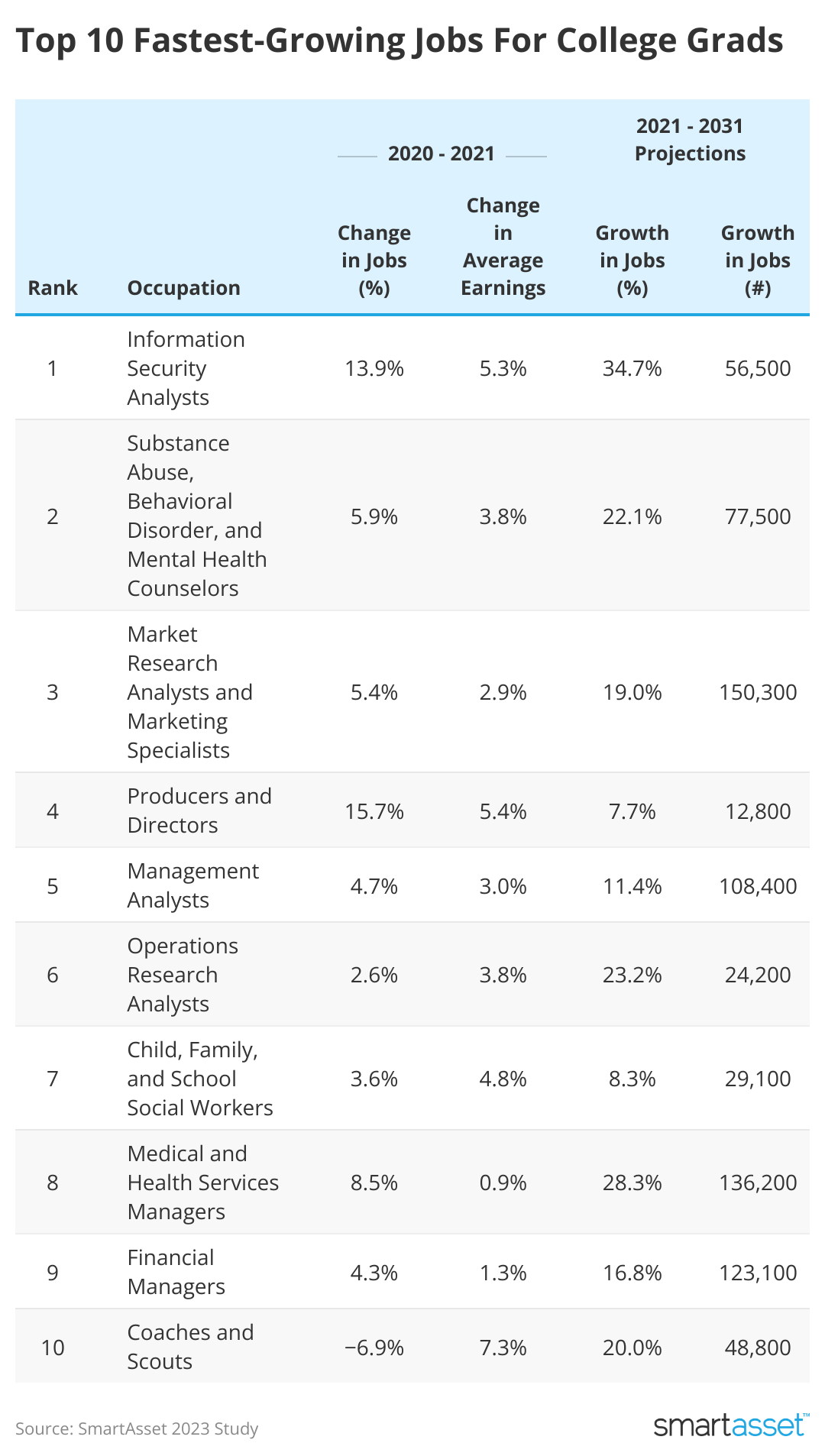Fastest-growing jobs for college grads

Canva
Fastest-growing jobs for college grads
A college graduate holds their mortarboard aloft against a backdrop of office buildings.
The U.S. labor market remained strong in 2022, adding another 223,000 jobs in December. But the Bureau of Labor Statistics predicts that the job market may cool off in years to come, projecting that total employment will grow only 0.5% annually between 2021 and 2031, which is half the growth rate between 2011 and 2021.
Keeping these potential job changes in mind, SmartAsset identified and ranked the fastest-growing jobs for college graduates. The study gathered BLS data from 144 professions that typically require a bachelor’s degree and compared them using four specific metrics: percentage change in average earnings from 2020 to 2021, percentage change in employment from 2020 to 2021, projected employment change from 2021 to 2031 and projected percentage change in employment from 2021 to 2031.
Key Findings
- Information security analysts remain No. 1. For the second year in a row, the role of information security analyst is the fastest-growing job for college grads. Government data indicates that 56,500 more people will be working in this booming field by 2031 than there were in 2021.
- Entertainment and sports professionals had the largest single-year increase in earnings. Agents and business managers of artists, performers and athletes saw their average earnings rise 18.7% to $116,410 in 2021. That’s the largest single-year earnings jump of any occupation tracked for this study.
- Broadcast professionals and nuclear engineers will face the biggest job decreases. Broadcast announcers and radio disc jockeys are projected to lose the biggest percent in employment from 2021 to 2031 (-11.4%), followed by nuclear engineers (-11.1%).
![]()

SmartAsset
The top 10 jobs that are projected to grow the most
Table showing the top 10 fastest-growing jobs for college grads.
1. Information Security Analysts
Information security analysts are responsible for protecting an organization’s computer network and systems. Most people in this occupation work for computer companies, consulting firms or financial companies. The BLS projects the field will grow a whopping 34.7% by 2031, the largest 10-year projected change in our study. These tech professionals also saw their average earnings increase 5.3% between 2020 and 2021, reaching $113,270 per year.
2. Substance Abuse, Behavioral Disorder, and Mental Health Counselors
Substance abuse, behavioral disorder, and mental health counselors help people with a variety of issues related to alcoholism, depression and other forms of addiction. Earning an average salary of $53,490, these professionals work with patients at mental health centers, community health centers or through private practices. Employment is expected to expand by 22.1% by 2031, the fifth-largest increase across the study. Another 77,500 people will be working in the field by then, the ninth-most among the 144 occupations analyzed.
3. Market Research Analysts and Marketing Specialists
Market research analysts and marketing specialists evaluate the potential sales of products and services by examining consumer preferences, economic conditions and other factors. Those working in the field earned, on average, $76,080 in 2021, just 2.9% more than a year earlier. However, the BLS projects there will be 150,300 more people in the occupation by 2031, which is the third-largest increase among the 144 professions studied. At that rate, the field would grow faster (19%) than all but nine other professions in the study.
4. Producers and Directors
Employment of producers and directors grew by nearly 16% in 2021, the eighth-largest single-year jump in our study. Producers and directors are responsible for making both business and creative decisions related to film, TV, stage and other productions. These professionals saw their average earnings rise 5.4% between 2020 and 2021 – the 13th-largest increase across the study – reaching $101,950.
5. Management Analysts
Management analysts recommend strategies to improve the efficiency of a business or organization, often with an eye on reducing costs and increasing revenues. The BLS expects this occupation will continue to grow in the years to come, adding 108,400 new workers by 2031. That projected increase ranks sixth-highest among all 144 occupations in the study. Management analysts on average earned $100,530 in 2021, up 3% from a year earlier.
6. Operations Research Analysts
Operations research analysts help organizations solve problems and make informed decisions about business, healthcare, logistics and other topics. These analysts have a variety of potential responsibilities, which may include helping a company allocate its resources or manage a supply chain. The BLS predicts employment in the field will increase 23.2% by 2031, fourth-most across the study. In 2021, the average earnings of operations research analysts rose 3.8% to $95,830.
7. Child, Family, and School Social Workers
Child, family, and school social workers focus on bettering the social and psychological health of children and their families. Those working outside of a school setting may help arrange adoptions or find foster homes for children, while those working inside a school often deal with teenage pregnancy, misbehavior and truancy. The occupation had the 21st-largest increase in average pay in 2021, when earnings rose 4.8% and reached $54,880. The profession will add another 29,100 jobs by 2031, which is the 23rd-most among all 144 occupations in the study.
8. Medical and Health Services Managers
Medical and health services managers are responsible for managing healthcare facilities, clinical departments or the medical practices of doctors. While average earnings ($119,840) grew by only 0.9% in 2021, employment in the field is projected to grow 28.3% by 2031 – second only to information security analysts. Meanwhile, the BLS projects another 136,200 people will be working in the field by 2031, fourth-most overall.
9. Financial Managers (Tie)
With average earnings of $153,460, financial managers are responsible for the long-term financial goals of an organization. Their work often involves creating financial reports and directing investment activities for the banks, investment firms or insurance companies that employ them. According to the BLS, the occupation is projected to grow 16.8% by 2031 and add 123,100 new jobs in that time, fifth-most across the study.
9. Coaches and Scouts (Tie)
While coaches teach athletes skills within their respective sports, scouts are responsible for evaluating players for potential success at the amateur, collegiate or professional ranks. Average earnings for coaches and scouts increased 7.3% in 2021 to reach $50,550. That was the fifth-largest jump in average earnings among all 144 occupations analyzed in the study. Employment is also expected to increase 20% by 2031 (ninth-most), adding 48,800 new positions during that time (16th-most).

Canva
Data and methodology
A large group of graduates wearing black mortarboards with red tassles
To find the fastest-growing jobs for college grads, the study looked at data for 144 occupations that the BLS classifies as typically requiring a bachelor’s degree for entry. The study compared the 144 occupations across four metrics:
- Percentage change in average earnings from 2020 to 2021. Data comes from BLS Occupational Employment Statistics and is for May 2020 and May 2021.
- Percentage change in employment from 2020 to 2021. Data comes from BLS Occupational Employment Statistics and is for May 2020 and May 2021.
- Projected employment change from 2021 to 2031 (gross figure). This is the projected change in the total number of people employed in an occupation from 2021 to 2031. Data comes from the BLS 2021 Employment Projections.
- Projected employment change from 2021 to 2031 (percentage change). This is the projected percentage change in the number of people employed in an occupation from 2021 to 2031. Data comes from the BLS 2021 Employment Projections.
The study ranked each occupation in every metric, giving full weighting to all four metrics. The study then found each occupation’s average ranking and used that to determine a final score. The occupation with the best average ranking received a score of 100, while the occupation with the worst average ranking received a score of 0.
This story originally appeared on SmartAsset and has been independently reviewed to meet journalistic standards.